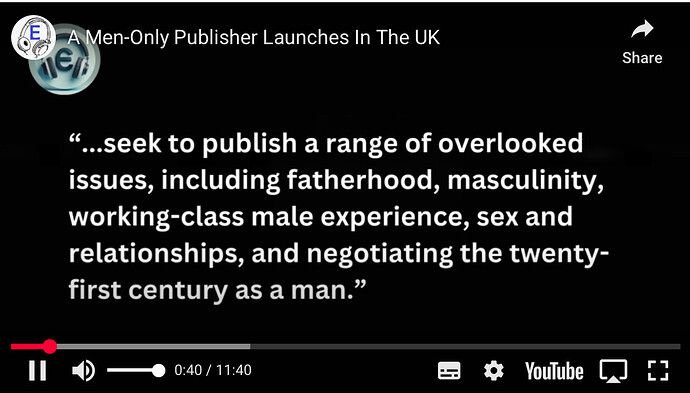Interesting video–thanks for sharing it.
The problem is presented as too many women as gatekeepers to traditional publishing. That may well be true, but why the whining? We men can independently publish. What can be more masculine than that?
I believe the latest statistics for the US show that men and women are published in ratios that almost exactly match their distribution in the overall population.
I was a bit surprised by this.
Even if women are acting as the “gatekeepers of traditional publishing”, it hasn’t stopped men being published in droves.
So. I had a look at the video and saw this:
That’s worryingly specific. ![]()
Why does it worry you?
I’m not speaking for @Rayz, but I infer that he is thinking about the distinction between the “men being published in droves” (perhaps a restatement of what @kewms wrote) and the feminized content that women as gatekeepers are publishing from male writers. (I’m stating the argument, but I don’t know the validity of the assertion, to be honest. Has content from male writers become more feminized? Arguably, if true, this would be worrisome. Is there any kind of study on this that would shine a light here?)
What does “feminized content” even mean?
It’s probably true that it’s more difficult to publish blatant sexism and misogyny in mainstream outlets these days. Is that “worrisome,” or an indication of changes in the culture?
That’s a good question. I suppose the screenshot shared by @Rayz is a good place to start: “…seek to publish a range of overlooked issues, including fatherhood, masculinity, working-class male experience, sex and relationships, and negotiating the twenty-first century as a man.”
I’m not speaking for @Rayz, but I infer that he is thinking about the distinction between the “men being published in droves” (perhaps a restatement of what @kewms wrote) and the feminized content that women as gatekeepers are publishing from male writers.
No, I was simply just stating that having female gatekeepers in the publishing industry hasn’t really made any difference to the number of men being published.
The problem that this new outfit is seeking to address is the type of content that it feels is missing from the bookshelves. And again, I’m still not seeing the problem.
If a book will sell, then the “female gatekeepers” will publish it. The problem is the audience: it won’t sell because the consumers of this type of content prefer to watch it on Andrew Tate’s TikTok page or listen to it on Joe Rogan podcasts.
The other problem is setting themselves up as “men-only”. There’s plenty of this stuff being churned out by the likes of Katie Hopkins and that American politician who shot her puppy.
I have to admit that I am entirely comfortable with a world where women are the publishing gatekeepers. Most of my publishing house’s acquisition editors are women.
I was just a little startled by the assertion that there could be an upstream current for anyone writing from a male perspective (and yes, what exactly does that mean?).
Anyway, interesting discussion.
This may give a clue, Google Search
But it is easy to find blatant sexism and misandry in mainstream outlets. No one finds that worrisome.
I am not worried about it because I don’t depend on publishing houses to approve my content.
Exactly…20
From what I can tell, the people in positions of influence and authority in the book industry are the people who had a strong enough interest in books to want to pursue a career in books.
They therefore get my vote.
I clicked the link so no one else has to:
a shift in societal values and norms towards those often associated with femininity, such as increased empathy, cooperation, and a focus on interpersonal relationships.
I find it fascinating that cooperation in particular is being framed as “feminine.” What do you think team sports are all about? Or even that most “masculine” pursuit, military units?
The cooperation part is just an unfortunate downside of menfolk being allowed to be competitive with some other team and then drink beer afterwards.
You may have cracked why the Lionesses are capable of winning soccer tournaments and the guys, well… the less said about that the better.
I’ve just watched the Tour de France – as I have done for decades. It’s a team race, but you’d never know it. They keep trying to raise the profile of the team competition, but no one’s interested.
I worked with an F1 team for a while. I was working for Big US Tech Firm, and they were my client. Inside the tent, the drivers were pretty superfluous. But that’s not how it’s marketed. As Big Team Boss Man told me in our first meeting: we’re in the entertainment business. I’d never thought of it that way, and it changed my view of professional sport forever.
re: military: that’s an enforced hierarchy, so behaviour is coerced. Also, when your life is at stake, you are going to collaborate or die. See also rock climbing and mountaineering.
Anecdata: I’ve met just as many tyrannical women as men. Best boss I ever had was a woman, and so was the worst. The idea that gender implies behaviour is just silly. People is people.
The people actually on the teams know.
In the US, team sports get the majority of audience attention by a very wide margin.
Sure, but that’s an argument that collaboration is essential, not an argument that it’s “weak.”
I’ve closely observed the behavior of two girls growing up (my daughters). Now I’m closely observing the behavior of two boys growing up (my grandsons). At the risk of sounding silly, I don’t recall my daughters thinking it endlessly fun to bonk each other on the head. But my grandsons? The three stooges had nothing on them.

